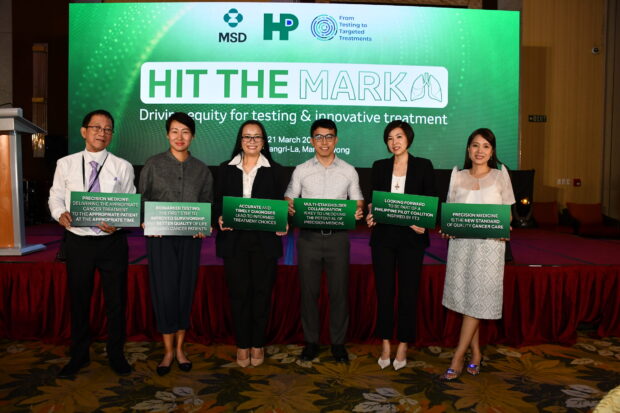A multi-stakeholder collaboration that aims to drive equity for lung cancer testing and treatment is finally here with the launch of the Hit the Mark, a campaign whose goal is to make precision medicine an accessible reality for all patients who could benefit from it.

HIT THE MARK: A multi-stakeholder collaboration to drive equity for cancer biomarker testing and precision medicine was launched last March 21.
L-R: Engr. Emer Rojas, President of New Vois Association of the Philippines; Melissa Ongsue, VP of Sales and Marketing at Hi Precision Diagnostics; Dr. Herdee Gloria Luna, President of Philippine Society of Oncologists; Dr. Jose Jasper Andal, a pathologist from St. Luke’s Medical Center; Vannessa Ongsue, VP For Medical Services at Hi- Precision Diagnostics; and Nina Corpuz, broadcast journalist and health advocate
Leading this campaign are patient advocates, healthcare companies, and providers, as well as medical professionals who share a belief that patients deserve access to the right testing and treatment at the right time.
This initiative is in line with the vision of the From Testing to Targeted Treatment (FT3) program, a not-for-profit, open and global community of practice dedicated to better patient outcomes.
After launching its first two pilots in Spain and Hungary last year, FT3 is trying to identify potential collaborative solutions and global best practices to these challenges through demonstration pilots and is now launching a local multi-stakeholder collaboration in the Philippines to work on solutions to improve patient outcomes. This program would nurture collaborations between all stakeholders to better address patient and healthcare professional needs in providing access to personalized healthcare solutions when it could benefit the patient.
“We’re using this partnership to identify the most important needs for patients and healthcare professionals in the Philippines, and we will work on solutions together,” explains Helena Harnik, Executive Director at FT3.
FT3 is inviting all interested parties to join the local pilot in the Philippines.
The potential precision medicine
Treatment for lung cancer depends on several factors. These include what type of lung cancer a patient has, how big it is and whether it has spread (the stage). It is also important to note that two people may have the same type of cancer, but no two people respond to treatment exactly alike.
For lung cancer, precision medicine is changing the game. Precision medicine is reshaping health care by moving away from the traditional one-size-fits-all model to focus on treating each patient as a unique individual. Unlike broad categories, precision medicine can tailor treatments to the specific needs of individuals, aiming to find the right treatment path, for the right patient, at the right time.
Biomarker testing is a significant pillar of precision medicine, which uses patient data to inform personalized treatment decisions. Biomarker tests are essential tools in the diagnosis and treatment of cancer. They can be used to provide precise diagnoses and identify patients most likely to respond to treatment, therefore informing treatment selection.
Addressing gaps
Personalized medicine can transform lives, but its potential benefits have not yet been fully realized. Barriers that prevent patients from benefitting biomarker-driven cancer treatments persist such as logistical issues, sequential or no biomarker testing, lack of funding, and low awareness.
But the good news is that the FT3 local pilot alongside other efforts are currently in place to address gaps in precision medicine.
In terms of access to biomarker testing, three biomarkers—PD-L1, EGFR, and ALK—have been unified in a lung panel test to benefit cancer patients for the first time, through the leadership of Hi Precision Diagnostics. “Previously, you did the testing one by one. By unifying these three biomarkers and publishing results immediately, the doctors can prescribe the right treatment right away, saving time for both the patients and the doctors,” shares Melissa Ongsue-Lee, VP of Sales and Marketing at Hi Precision Diagnostics.
Hi Precision also now provides nationwide coverage, which was earlier limited only to the metropolitan areas. There may be available options for patients to have their tests subsidized upon consultation with their doctor.
Hopefully, by making testing more convenient for patients, those eligible can gain access to the best treatments for them.
ADVT.